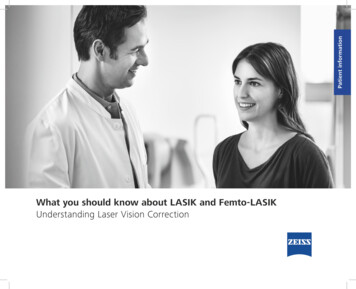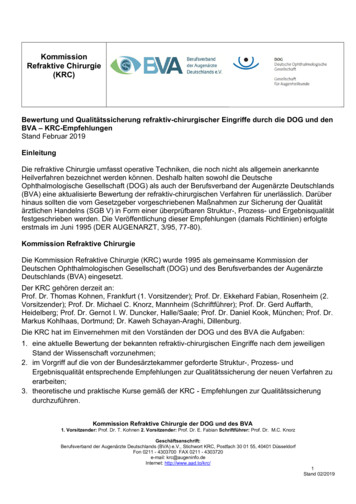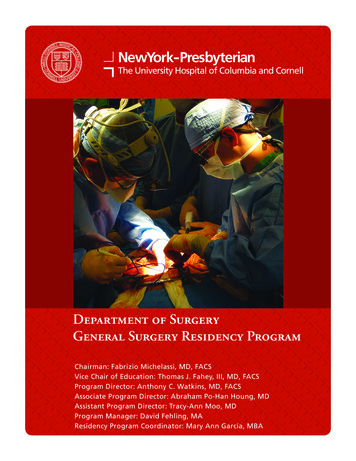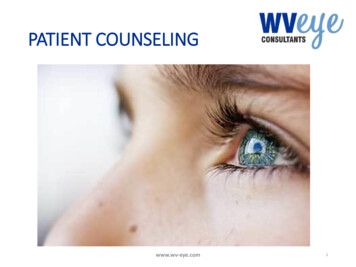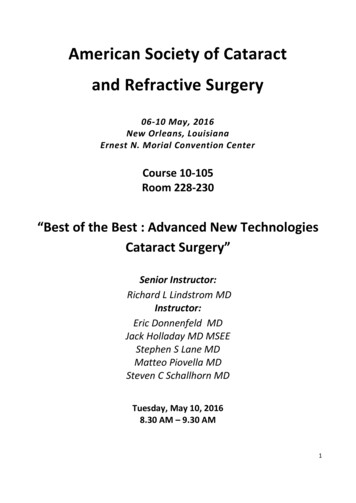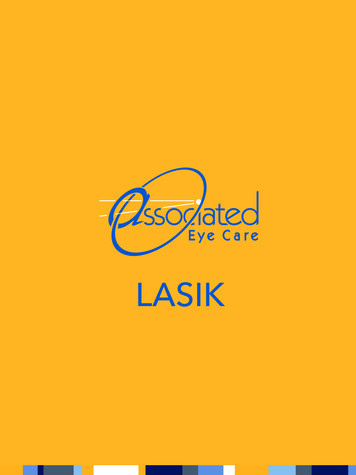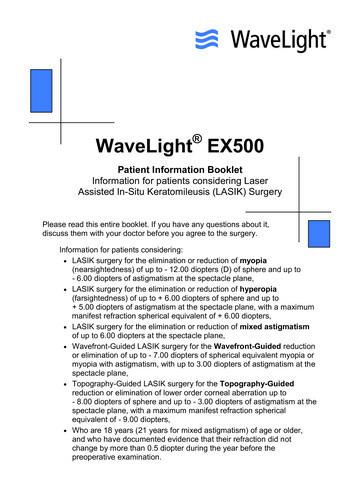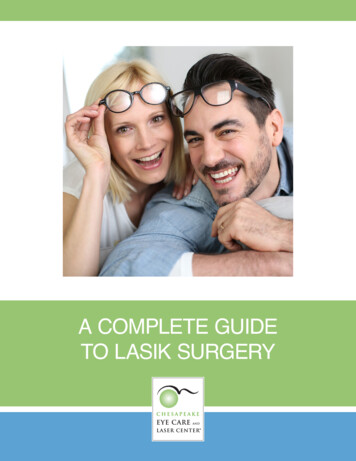
Transcription
A COMPLETE GUIDETO LASIK SURGERY
Maria Scott, M.D.Dr. Maria Scott is the founder andmedical director of ChesapeakeEye Care and Laser Center and themedical director of TLC Laser EyeCenter Annapolis. She is one of thenation’s most respected cataract andrefractive surgeons. With a reputation forexcellence that extends from her patientsto colleagues throughout the medical community,her passion to improve her patients’ quality of life is evidentthroughout every aspect of the practice. Always ahead ofthe curve, she is often the first to offer new techniques andtreatments to her patients and was the first person to offerLASIK in Annapolis. Focused on results, she has one of thelowest enhancement rates for LASIK patients in the country.Recognized as a leader in her industry, Dr. Scott trains andsupervises other ophthalmologists in laser vision correctionand hosts symposiums throughout the year in order to keepher colleagues abreast of the latest ophthalmic treatments.She is a member of the prestigious Society for Excellence inEyecare, an organization of eye care specialists personallyselected and recognized for their leadership and innovation.She is a member of the American Society of Cataract &Refractive Surgeons, American Academy of Ophthalmology,Ophthalmic Women Leaders, Women in Ophthalmology andthe American College of Eye Surgeons. Since 2011, she hasserved on the board of directors of the Anne Arundel MedicalCenter Foundation.Accolades from peers in the medical community and patientshave brought Dr. Scott numerous awards, including What’sUp Annapolis “Top Doc” honors, the Capital Gazette’s“Readers’ Choice for Ophthalmology”, Bay Weekly’s “Bestof the Bay – Best Place for LASIK”, and the Vitals “Patients’Choice for Top Ophthalmologist.”
Table of ContentsIs LASIK Right for Me?4How LASIK Works5Choosing a Surgeon:Questions to Ask6Preparing for LASIK8What to Expect the Dayof Your Surgery9A LASIK Success Story11What Does LASIK Cost?13
Is LASIK Right for Me?Glasses can be a fun fashion accessory, but you might wonder what it would be like to be free ofthem. Contact lenses work fine, but they may preclude you from certain lifestyle activities and theyrequire maintenance, such as cleaning, storing and changing. It’s no wonder that many peopledream about life without corrective lenses.Are You a GoodCandidate for Lasik?Dr. Maria Scott, a board-certified refractivesurgeon, will examine your eyes carefully tomake sure you are a good candidate for LASIK.If you are at least 21 years of age, have goodeye health with no diseases such as cataractsor glaucoma, and are in good overall health,you may be a candidate for LASIK.In addition to looking at the uniqueness ofyour eyes, it is equally important to discussyour lifestyle and visual expectations withthe surgeon prior to surgery. You will alsowant to discuss the type of work you do, asit may impact your candidacy. For example,some military positions and other fields havestipulations for LASIK. If you think you might fallinto this category, you’ll want to check with yoursupervisor before having eye surgery. Lastly,as with any surgical procedure, there arerisks and these will be discussed duringyour consultation.4 Chesapeake Eye Care
How LASIK WorksDuring LASIK surgery, anesthetic drops are applied to the eye. Then the surgeon creates aprotective flap in the cornea (the part of the eye that helps you focus light to create an imageon your retina) using a bladeless laser. This flap is then gently lifted as the surgeon appliescomputer-controlled pulses of cool laser light to the inner layers of the cornea. The inner corneallayer is reshaped with the laser to improve vision or eliminate the need for prescription lenses.Introduced in the United States in the 1990s,LASIK corrects refractive errors in your visionthat cause the most common vision problems,including near-sightedness (myopia), farsightedness (hyperopia) and astigmatism.LASIK surgery helps some 700,000 patientseach year to reduce their dependence onglasses and contacts, but not everyone is acandidate for the 2 Medical ParkwaySajak Pavilion, Suite 320Annapolis, MD 214015
Choosing a Surgeon: Questions to AskThanks to new technology, LASIK surgery is now safer and more effective than ever. It is stillimportant, however, to minimize your risk of negative side effects by choosing a highly skilled andexperienced LASIK surgeon to perform your procedure. When considering LASIK surgery be sure toaddress each of the questions listed below with the practice and surgeon you are considering.What Percent of YourPatients Need an AfterSurgery Enhancement?Nationwide, about eight percent of all patientsrequire a second adjustment surgery after theirinitial LASIK surgery. A surgeon’s enhancementrate is a good marker of his or her skill. Youshould look for a surgeon with an enhancementrate below 8%; the lower the better. Dr. MariaScott of Chesapeake Eye Care and LaserCenter, for example, has an enhancement rateof just 1.5%, which indicates that she performsher operations very precisely and withgreat care.What Equipment is Used toPerform the Surgery?Make sure that any equipment used to performthe LASIK surgery is approved by the FDA.Here at Chesapeake Eye Care and LaserCenter, we use AMO’s IntraLase laser, a 4thgeneration laser designed primarily for LASIKand advanced corneal surgery procedures. It isimportant to make sure that your surgeon offersthe most advanced, proven technology andtesting to achieve the best results possible.6 Chesapeake Eye CareHow is the Flap Created?The first step in LASIK surgery is the creationof a flap in the cornea. In traditional LASIK,this flap is made with a handheld scalpel.Some surgeons still prefer to create theflap in this manner, which is an acceptablemethod. Others, including Dr. Maria Scott atChesapeake Eye Care and Laser Center, usea special laser to create the flap. Known asblade-free LASIK and all-laser LASIK, thisflap creation technique is associated witha lower risk of flap complications thantraditional LASIK.Who Handles Patient Aftercare?It is ideal for your surgeon or his/her teamof doctors to be involved in your aftercare.This assures that any problems are detectedearly and you receive accurate, thoroughanswers to your questions post-surgery. Insome laser surgery clinics, however, aftercareis overseen by medical technicians ratherthan the surgeons themselves. Asking eachsurgeon how post-surgery visits are handled isimportant to know ahead of time.
Do You Have Any ConcernsRegarding My Suitabilityfor LASIK Surgery?Good LASIK surgeons conduct thorough eyeexams before telling you whether or not theyconsider you a candidate for the surgery.Never agree to have LASIK surgery performedby a LASIK surgeon who does not performpre-operative testing and a thorough eye exam,or by one who is not willing to discuss yourpersonal risks with you in-depth beforethe procedure.Your LASIK surgeon should be willing todiscuss any medical conditions that you haveand how they might impact the effectivenessand safety of LASIK for you. It is also importantfor your surgeon to understand your lifestyleand visual expectations. These are importantfactors for your candidacy, as well as preoperative tests.As you interview different LASIK surgeons,be sure to ask these questions and don’tbe afraid to jot down notes as the surgeonsrespond. Surgeons who have solid answersto your questions, a consistent track recordfor delivering results, a great reputation in thecommunity, advanced technology, and thorougheye exams to determine your candidacy arelikely to be the most qualified to perform thisprecise and specialized operation.What Kind of Training andExperience do You Have?When considering a LASIK surgeon, make surethey are board-certified ophthalmologists whohave experience performing LASIK surgery andask them about their results. Finding a skilled,well-trained surgeon who has a consistentrecord for delivering great results is importantin making your 02 Medical ParkwaySajak Pavilion, Suite 320Annapolis, MD 214017
Preparing for LASIKNow that you’ve made the decision to get LASIK to correct your nearsightedness, farsightedness orastigmatism, you might be a bit nervous, wondering what to expect, what your recovery will be andhow to prepare for your upcoming procedure so you can achieve the best possible outcome.Preparing for Your ProcedurePrior to your LASIK eye surgery, you’ll meetwith one of our professional and dedicatedstaff members to go over your expectations,preparations you should make, and anythingpertaining to your individual case andprocedure. Any specific concerns you mayhave can be addressed at that time; however,in preparing for your LASIK eye surgery, thereare a few requirements you’ll need to follow inorder to ensure a successful outcome.If you wear contact lenses, you’ll need to followcertain protocols depending on the type oflens. You will need to remove your contactlenses according to the following schedule: Soft Daily Wear – Two weeks prior towavescan pictures and surgery. Toric – Three weeks prior to wavescanpictures and surgery. Extended Wear – Four weeks prior towavescan pictures and surgery. Rigid Gas Permeables (RGPs) and HardLenses (PMMAs) – dependent on use. Youwill need to discuss this with your surgeon.Given these requirements, you should scheduleyour initial evaluation at least a month inadvance and, at that time, switch to glassesonly. The reason you’ll need to remove your8 Chesapeake Eye Carelenses and change over to glasses only is thatcontact lenses distort the shape of your cornea.That’s why they work. By giving your eyes anopportunity to form their normal shape, you canbe sure the corrections made by your LASIKeye surgeon meet your needs and result in thebest possible outcome.Don’t wear eye makeup or use eye creams forat least 24-48 hours prior to your surgery. Youmay be given specific instructions on how toclean your eye area prior to the procedure.Additionally, you may have other preparationsto follow such as not using hairspray, powders,lotions or scented products the day of surgery.By following the specific instructionsprovided by your doctor, you will lower yourrisk of infection.The morning of your procedure, you mayfeel a bit nervous. This is expected and theprofessional staff at our clinic will do everythingpossible to make you comfortable. Be sureto eat a light meal and bring someone withyou, or arrange for a ride home. Although theprocedure is typically over in 15-20 minutes,having a friend or family member close by canbe a comfort. Also, you will need someoneto drive you home, since your vision will beunfocused and blurry.
What to Expect the Day of Your SurgeryLASIK is a quick and painless procedure that can significantly improve your vision and dramaticallyimpact your lifestyle. Here is a summary of what happens on the day of LASIK surgery.Before LASIKBefore carrying out the procedure, your eyedoctor will examine your eyes to ensure thatyou are a suitable candidate for LASIK. Oneof the exams will include the use of a cornealtopographer to record the shape of yourcornea. LASIK works by subtly changing thecurvature of this part of your eye so that it isbetter able to focus light.The LASIK ProcedureBefore beginning your laser eye surgery, yoursurgeon will use numbing eye drops to preventdiscomfort. Specific medical equipment willbe used to gently hold your eyelid open duringsurgery to prevent you from blinking.The first step in the LASIK procedure is tocreate a flap in the cornea either by using alaser or a very precise blade. Once the flap hasbeen created and carefully lifted, the surgeonapplies computer-controlled pulses of coollaser light to the inner layers of the cornea.The inner corneal layer is reshaped with thelaser to improve vision or eliminate the needfor prescription lenses. You should not feel anypain as the laser correction takes place. Youmight experience a slight sensation of pressure.The procedure uses Iris Registration, analignment method that maps 40 points on theiris and focuses the laser using these points,to track eye movements to ensure precisecorrection. When one lies down, the eyesnaturally rotate and the pupils may migrate. IrisRegistration detects any eye movement andallows the laser to rotate with these movementsto ensure accurate treatment. The surgeonthen gently replaces the flap and aligns it to its1-877-DR4-2020www.ChesapeakeEyeCare.com2002 Medical ParkwaySajak Pavilion, Suite 320Annapolis, MD 214019
original position. The whole procedure takesabout 15 to 20 minutes.After the ProcedureAfter surgery, you will need someone todrive you home. Your LASIK eye surgeon willsuggest taking a long nap and rest as much aspossible to allow the eyes to heal. To preventaccidental rubbing while the flap is healing,patients will be given a protective shield towear at night following surgery. Some patientsmay feel slight irritation for a few hours, butmost are quite comfortable after a napand rest.Most patients will experience a 50%improvement by that evening and 70%improvement by the next day. A patient’s visionshould be fully restored within 1 – 4 dayswithout the need for any corrective lenses.Most patients return to regular daily activitywithin 24 hours.What to Expect After SurgeryAfter LASIK eye surgery, you will have a followup appointment to check your vision anddetermine whether you need further correction.Although TLC research findings show morethan 90 percent of people who have LASIKachieve somewhere between 20/20 and 20/40vision without glasses or contact lenses aftersurgery, there is no guarantee of perfect 20/20vision after eye surgery. However, a reviewpaper published by the American Academy ofOphthalmology reported that 95.4% of patientsare satisfied with the results they achievedthrough LASIK eye surgery.11 - 337-7/abstract10 Chesapeake Eye Care
A LASIK Success StoryOne of our patients was willing to share how LASIK affected her every day life and activities – readfirsthand how LASIK can change your life!What made you finally take the plunge andget LASIK?Shaina: I had been thinking about doing itfor at least 10 years. In the months leading upto my decision to finally have LASIK surgery,I talked to lots of people that had LASIK. Ireceived positive feedback from them andjust decided I was tired of my glasses andneeded a change. Talking to others helped meovercome my fear of problems that could occurfrom the surgery.What was your life like before LASIK?Shaina: I wasted time in the morning lookingfor where I left my glasses. I was unhappy withwearing glasses to social events - contactswere uncomfortable for me. I did not like thelook of my glasses and the cost ofprescription sunglasses.What held you back from getting LASIK?Shaina: I was scared of complications fromsurgery, like getting dry eyes, my vision notbeing altered enough, and having life- longproblems from surgery.How has LASIK changed your life?Shaina: I feel FREE! I can just get up and go!I don’t have to look for my glasses. I don’t haveto worry about them fogging up or getting wetduring outdoor activities. I don’t have any moredents on the bridge of my nose. I don’t have tothink about wearing contacts to social eventsand how uncomfortable they will be.Now having LASIK, are you more likely topursue different activities?Shaina: Not really, but Lasik makes all of theactivities I do sooo much better. I don’t have1-877-DR4-2020www.ChesapeakeEyeCare.com2002 Medical ParkwaySajak Pavilion, Suite 320Annapolis, MD 2140111
to worry about losing my glasses when I goswimming, to the beach, kayaking, paddleboarding, etc. I don’t have to worry about myglasses falling off and getting broken.What would you tell someone who isconsidering LASIK?Shaina: Talk to others who had it done.Carefully follow all the pre- and post-opinstructions.don’t get lazy with the drops. Beready to enjoy life free of glasses and contacts.Months after the procedure you won’t be ableto remember what life was like with glasses andwill wish you had done it sooner.Why did you decide to have Dr. Maria Scottdo your surgery?Shaina: I selected Dr. Maria Scott based onher experience and reputation. As I researcheda surgeon for LASIK, I found that Dr. Scott hasreceived many awards and accolades fromcolleagues and patients. I also happened torun into many of Dr. Scott’s patients aroundAnnapolis and they spoke very highly of her,the LASIK process and her incredible results.12 Chesapeake Eye Care
What Does LASIK Cost?LASIK eye surgery will vary in price depending on your treatment and the service provider; however,there are average amounts that you can use to estimate the per eye cost of surgery. If you think thesurgery is for you, starting to save early and planning financially is a great option.making your decision to have LASIK surgery,it is important to consider the experience andskill of the surgeon and the technology she orhe uses.Health Insurance May HelpDon’t be Fooled by Cheap DealsConsumers will often see ridiculously low priceoffers for LASIK eye surgery. These offers canbe very misleading and result in you having aprocedure that is not right for your eyes. Whendetermining where to have your surgery, yourdecision should be based on more than justprice. Other factors including the surgeon’sexperience, results, equipment (type of laser),and current condition of your eyes weighheavily on the cost of surgery as well as theoutcomes you can expect.Costs for surgery vary depending on the typeof LASIK surgery you get. Traditional LASIK isthe least expensive. If you have Custom LASIKor Custom Bladeless LASIK, you can expectthe cost to increase. Using the most advancedtechnology often enhances the results. WhenHealth insurance should definitely be on yourmind when considering LASIK eye surgery.Most insurance companies do not cover LASIK,but you should always contact your insuranceprovider to determine if your health plan coversany part of the surgery.Flexible-Spending Accountscan Cut CostsThe use of a flexible-spending account canhelp you reduce your LASIK eye surgery bill.Contributions to this type of account are madethrough pre-tax payroll deductions. Becausethe funds are not taxed, they represent asubstantial savings towards the cost ofthe procedure.Figuring out how much LASIK eye surgerycosts can be confusing. Start by speaking witha qualified LASIK eye surgeon to determinewhat procedure you need. From there, you canestimate costs and start planning ahead for yourbig LASIK day.1-877-DR4-2020www.ChesapeakeEyeCare.com2002 Medical ParkwaySajak Pavilion, Suite 320Annapolis, MD 2140113
CALL TODAYSchedule Your Consultationwith Dr. Maria Scott1-877-DR4-20202002 Medical ParkwaySajak Pavilion, Suite 320Annapolis, MD 214011-877-DR4-2020www.ChesapeakeEyeCare.com
2002 Medical Parkway Sajak Pavilion, Suite 320 Annapolis, MD 21401 1-877-DR4-2020 www.ChesapeakeEyeCare.com 5 How LASIK Works During LASIK surgery, anesthetic drops are applied to the eye.

